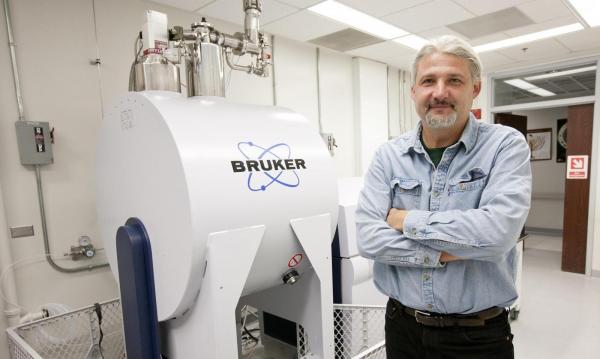
March 29, 2016
Lincoln, Neb. — A device developed by University of Nebraska–Lincoln Associate Professor of Biochemistry Jiri Adamec, in collaboration with Novilytic, LLC could potentially transform the process of testing for the Zika virus. The Noviplex card allows for cost-effective prescreening of the individuals exposed to the virus without the assistance of a medical professional.

One of the major challenges the world is facing with the Zika virus is that it is hard to map the areas that have been affected. While a test has been developed to screen for the virus, it lacks specificity, increasing false positive negative rates, meaning that some noninfected individuals will be positively identified and some of those exposed to virus won’t be.
“The current Zika virus outbreak is affecting remote areas such as the Amazonian region of Brazil and it’s extremely difficult to get to those areas to screen residents for the virus,” said Adamec. “Medical professionals have to fly in and out by helicopter very quickly to ensure the blood samples remain stable at a low temperature.”
The Noviplex card only requires a small drop of blood from a finger prick. Plasma from the sample is then separated from the whole blood. This device is the first to split a single application of blood into two equivalent plasma samples without the use of a mechanical splitter. Even in the warm and humid Amazonian region, the sample on the card will remain stable for several weeks, meaning it could be sent to a medical facility and tested with sophisticated technology to determine a diagnosis.
Adamec and his colleagues from their private firm Novilytic, L.L.C are now building partnerships in Brazil to distribute the Noviplex cards to remote regions believed to be affected by the virus.
The prescreening capabilities of the Noviplex card are not limited to the Zika virus. According to Adamec, the device could be used anywhere and can prescreen for any number of diseases.
Another project the device is being used for in Brazil is prescreening for mercury in fish and humans. Brazil’s illegal gold mine operation is resulting in mercury being disposed of in local rivers. The mercury is reaching fish and other marine life that humans are eating. Long-term mercury effects on humans could result in neurodegenerative diseases. The Noviplex card will soon be distributed to eight South American states in the Amazonian region. The World Health Organization is monitoring this project.
Funding for Adamec’s research at UNL and Novilytic comes from National Institutes of Health Small Business Innovation Research Phase I and Phase II grants. In 2014 Novilytic received an R&D 100 Award for Noviplex. The award is an international competition that recognizes the 100 most technologically significant products introduced into the marketplace over the past year.
Noviplex card technology is also being used by the Brazilian Olympic Team to monitor plasma biomarkers in athletes and there is a possibility to adapt the device to determine biomarkers of brain injury which can be beneficial to football players. From prescreening for viruses to monitoring athletes the Noviplex card has the potential to impact healthcare in many ways.
“It’s difficult to say what impact Noviplex will have in the next five years, because the possibilities are really endless,” Adamec said.
Jiri AdamecDepartment of Biochemistry
402-472-7369
jadamec2@unl.edu Haley Steinkuhler
IANR Media
402-472-4398
hsteinkuhler2@unl.edu